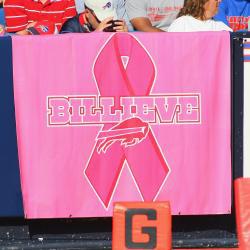October can be lonely for those of us who’ve lost someone to cancer that doesn’t merit a pink ribbon. Ever since my mother died of colorectal cancer 15 years ago, I’ve felt uneasy about this month. Any cancer diagnosis means joining a club you’d rather not be a member of, but some clubs are better organized than others, and breast cancer is one of the best. In 1985, the breast cancer awareness campaign started as a weeklong event. Today you can hardly turn around in the supermarket aisle without bumping into something swathed in Pepto-Bismol pink. The campaign has raised awareness and billions of dollars, but has also provoked backlash from critics like sociologist Gayle A. Sulik, author of Pink Ribbon Blues. Sulik found that more money and earlier detection didn’t actually translate into reducing the chances of women dying of the disease. Still, I’m slightly jealous of the pink ribbon’s domination of the cancer conversation.
My mother was diagnosed with late stage colon cancer and died a year later, a month after her 53rd birthday. What strikes me still is the loneliness of her experience. For her, it started with a standard hemorrhoid operation. Hemorrhoids were uncomfortable, unsightly, embarrassing, but surely not deadly, I remember thinking. Though my mother tried to shield my sisters and me from the worst of it, I remember her embarrassment about the debilitating, unpleasant symptoms she endured. Colon cancer involves parts of your body that you don’t think about (let alone discuss) unless there’s a problem. And symptoms like blood in your stool and runny diarrhea generally don’t lend themselves to feel-good public health campaigns.
In 1994, I don’t think colon cancer made it onto my mother’s radar screen of possibilities. Much progress has been made on the colon cancer front since then, and efforts to increase public awareness like Katie Couric’s much-discussed televised colonoscopy have helped in concrete ways. But it’s hard to say if my mom would have been any more aware today. When I had my own troubling symptoms a few years ago, I immediately thought, “I’m young. It’s probably nothing.” But my family’s medical history pushed me to get a colonoscopy. It was nothing, but my family history provides the kick in the pants I need to take something seriously. What if I didn’t have this history?
That’s the question that makes me wonder whether the success of breast cancer awareness has led to a potentially dangerous kind of tunnel vision. Take lung cancer, breast cancer’s ugly stepsister, for example. Despite declining smoking rates it remains the No. 1 cancer killer of both men and women and kills more people than breast, prostate, and colon cancer combined. There are state-sponsored quit hotlines and nicotine patch giveaways but scant public health information about warning signs like a cough that won’t go away as well as less obvious symptoms that tend to present in women like shortness of breath, pain in the back and shoulders, and unusual fatigue. Research funding for lung cancer pales in comparison to funding for breast cancer, and in 2010 the National Cancer Institute allocated just $281 million to lung cancer research compared to $631 million for breast cancer.
This October, I’d like to make peace with breast cancer awareness month. Its success doesn’t have to mean crowding out all other diseases that affect women, and I’d urge women’s health advocates to continue to expand public dialogue about health problems and diseases that affect parts of women’s bodies other than those we have gotten used to talking about. What have we learned from over 25 years of breast cancer advocacy and how can we apply those lessons to improving women’s lives and fighting other equally insidious forms of cancer and disease?
